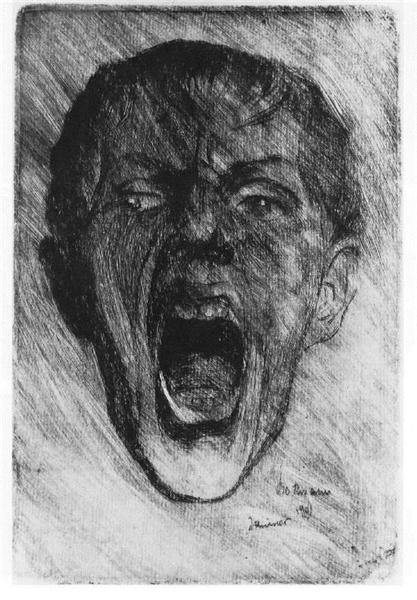Description
The painting "Self -portrait - 1901" by Max Beckmann stands as a powerful manifestation of the complex identity of the artist and his intimate dialogue with the viewer. This self -portrait, created when Beckmann was only twenty -nine years old, stands out not only for its technical quality, but also because of its deep emotional and psychological burden that anticipates the fundamental themes of its subsequent work.
When observing the composition, a deliberate and bold use of space is perceived. Beckmann is presented at the center of the canvas, in a kind of frontal encounter with the viewer. The figure of the artist occupies a predominant place, which suggests a deep introspection. His look, intense and penetrating, seems to invite the viewer to a confrontation. The way it presents, with a serious and almost challenging gesture, reveals the author's internal concerns in a moment of changes and challenges in his personal and professional life.
Color management in this work is remarkable. Beckmann uses a palette that oscillates between dark tones and terracotta color variations, creating an almost gloomy and oppressive environment. The colors not only contribute to the atmosphere of the self -portrait, but also act as a means to express the emotional state of the artist. The combination of lights and shadows gives volume to the figure, accentuating the tridimensionality and physical presence of Beckmann in the fabric. This technique is a distinctive seal of his style, which will continue to evolve throughout his career.
At the bottom of painting, Elements that are not clearly identifiable are suggested, which seem to refer to a sickly atmosphere and a context of instability. It can be interpreted that these abstract elements in the background are a reflection of anxiety and alienation that the artist experienced, a recurring theme in the European context of the time, marked by social and political tensions. Stripped of specific narrative details, the environment becomes a canvas that reinforces the introspection of the subject.
"Self -portrait - 1901" It is not only a sample of Beckmann's technical virtuosity, but it is also a precursor to his subsequent work, in which he will explore the psychology of his characters and the portrait as a means to express existential concerns. In comparison with other self -lungs of his time, Beckmann's work is distinguished by his emotional load and the way he redefines the act of looking. His direct gaze and his resolved position contrast with the most delinquent approach than other contemporary artists could have adopted in their representations.
Max Beckmann, a German artist whose work will travel between expressionism and symbolism, left an indelible mark on the history of modern art. Throughout his career, his work will question the social and artistic norms of his time, becoming an emblematic figure in the development of a unique sensitivity in the art of the twentieth century. Beckmann's production is imbued with a sense of drama and introspection that is manifested in each line, making its "self -portrait - 1901" a fundamental work to understand not only its biography, but also the restless spirit of its time.
KUADROS ©, a famous paint on your wall.
Hand-made oil painting reproductions, with the quality of professional artists and the distinctive seal of KUADROS ©.
Art reproduction service with satisfaction guarantee. If you are not completely satisfied with the replica of your painting, we refund your money 100%.

